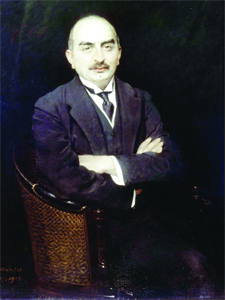
 Portugal
Portugal
By Daniel Silva in
The Calouste Gulbenkian Foundation, named after a Turkish-born Armenian oil tycoon who left his fortune to the country, has given out two billion euros (2.5 billion US dollars) at current prices since it was set up in 1956, a year after his death.
Money provided by the foundation has also funded the nation's top symphony orchestra, several rehabilitation centres for the handicapped and exhibition halls as well as the restoration of historical sites.
“The truth is that this foundation is the most extraordinary lucky break in the history of this country,” sociologist Antonio Barreto said last month at a ceremony marking the 50-year anniversary of the approval of the foundation's statutes.
Barreto is writing a book on the impact that the foundation's vast resources have had on
Gulbenkian, who made his fortune in the Middle East, lived at a
The will specified that the foundation must be based in
Under the care of its executors the foundation's assets have risen to just over three billion euros, equal to two percent of Portugal's gross domestic product, from the equivalent of 14 million euros when it was founded in 1956.
It is
Among its holdings is oil company Partex, which has interests in
The foundation has an annual budget for its charitable activities equal to four percent of its overall assets, which this year amounted to 113 million euros, more than the budget of some government ministries. Roughly 80 percent of the money is spent in
Gulbenkian's art collection, which includes Egyptian sculptures, Chinese Qing vases and scores of gold and silver Greco-Roman coins, is on display at a Lisbon museum set in a park that shares his name which has become one of the nation's top tourist attractions since it threw open its doors in 1969.
“I think we'll never be able to thank him sufficiently for his generosity,” the president of the foundation, Rui Vilar, said in an interview published in July in literary magazine JL.
One of the first ventures which the foundation bankrolled was the creation of a network of traveling libraries which operated out of a fleet of buses, lending books to readers in the most remote parts of the country. Five years after the foundation was set up it operated 61 “library buses” alongside 156 permanent libraries at a time when
“Few actions touched the interior of
Since its establishment the foundation has given out more than 65,000 scholarships. Before
Born in 1869 to a family of well-to-do Armenian merchants in Scutari, now part of
AFP
Also published in the “Bahrain Tribune”, 6 August 2006
http://www.bahraintribune.com/ArticleDetail.asp?CategoryId=4&ArticleId=117253

I do believe Portugal, country that Mr. Caloust Gulbenkian left his endless fortune ought to consider (a suggestion) to firstly admit more Armenians to go study there (on scholarships)… Secondly, Portugal ought to have its Embassy in Armenia, thus encouraging Armenia to open one in Lisboa.
These two steps may help introduce more of each country's culture to the other's populace. I have seen buses with huge name of Gulbenkian on them in NY. Why not order some buses for Armenia, set up Gulbenkian science learning centres in Yerevan. En fin, I would earnestly request the newly appointed Armenian head of that Foundation's Section for Armenian Affairs to also try to set up a National Investment Trust Fund, pivotal one and the precursor of the one that this servant of the Armenian people is advocating ought to be established in Switzerland. Nucleus of which I suggest be founded by our 6/7 magnates.
Since it is very difficult for us Armenians to organize such a venture so very easily, best would be to initiate it from Lisboa (Gulbenkian's Armenian Section). If the newly appointed head of the Armenian Section (sorry, forgot his name) is the least interested in above suggestions, I'd be delighted to respond to his queries, thankfully.
Cordially, G.P.